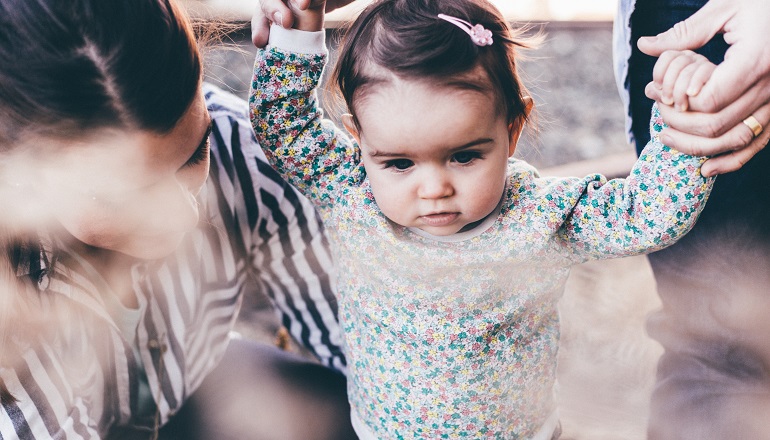Myths may be half-truths, but these half-truths just aren’t good enough when it comes to a subject as important as adoption. It’s certainly no surprise that people who are unfamiliar with adoption buy into many of these myths, especially when they’re perpetuated by the media and the culture in general; what is surprising is that lots of us within the adoption circle have certain misinformed beliefs about adoption that continue to flourish in our community. These are some of the adoption myths held by many adoptive parents:
Myth: We have to be the perfect parents to adopt.
Our bodies haven’t done what they were physiologically designed to do from the time of the ancients—long before Clomid, IVF and GIFT. The first paradox in the adoption process is that we go into it feeling flawed and try to come across as completely perfect. We seem to be at our worst when we’re trying to look our best.
Adoptive parents try awfully hard to be sweet, sincere and stable. We fill out those dreadful application forms as if we were none other than Penelope Leach and T. Berry Brazelton, but few of us come close. The fact is, some of us aren’t particularly enamored with kids in general; we don’t have to love other people’s children to want our own or to know that we’ll be good parents.
Myth: Adoption professionals are the enemy.
Adoption attorneys, clinicians and social workers seem to have a lot of power over people who feel like they have none of their own. Would-be adoptive parents imagine that, if only they were impressive enough, one of these adoption workers would spare them from having to slog through the seemingly endless process and just bring them the child they’ve been waiting for.
There is a sense that they—adoption professionals—have something we—adoptive parents—want and we can’t wait much longer than we’ve already been waiting.
Because we perceive adoption professionals as controllers of our fate, it’s a little scary to share some of our less-than-positive feelings. The bubbles over our heads might be saying one thing (like “How the heck would YOU answer that question you just asked me?”) and our mouths might be saying something else.
The truth is that adoptive parents and adoption professionals are working toward the same goal. It’s also important to remember that lots of people in the adoption field have chosen this profession because they are members of the adoption triad, and they know how we feel.
Myth: If we wanted a child enough, we wouldn’t care what kind we got.
People wanting to adopt may be desperate, but they’re picky, too. They don’t always come out and say so, though. It seems to have become politically incorrect to have certain preferences; yet, there are probably some good reasons for certain choices within a particular family culture.
Adoption of older children, children with special needs, or kids of a different race might not be right for everybody. Adoptive parents need to be brutally honest with themselves about what feels right, not what seems right.
Myth: We will fall instantly in love with our child.
Ingrained in our psyches is the notion that we’ll take one look at our new baby or child, fall instantly in love, walk into the sunset together and live happily ever after. This could be called the myth of bliss. It takes time and shared experiences for many new parents (even the biological variety) to feel this kind of love.
Once a child comes along, everyone seems to be rooting for our constant cheerfulness—as if our biological urges will cease and desist, as if we won’t feel the losses associated with adoption, only the gains. The less-than-gleeful emotions experienced by some new adoptive parents need not be construed as ungrateful, but rather as normal, mixed feelings that accompany any major life change.
The message from others for adoptive parents to “move on” points to a certain level of discomfort with the reality that an adopted child comes with a pre-existing history and set of first parents. Adoption is much too complicated to expect that the feelings associated with it will be simple.
Myth: Real women do hard labor.
Lots of new parents, especially women, feel like impostors—as if, without an episiotomy, we are not the authentic item; as if we’d know what to do with a crying newborn, if we had given birth to him or her. This myth is perpetuated by people who ask about our child’s real mother but it also comes from an internally-generated feeling of self-doubt.
If we start to act like we think a real parent would, we eventually become one. In other words, fake it ’til you make it. In the eyes of our children, we are mom or dad. It’s important to claim our titles, because our sons and daughters are counting on us to be nothing less than the real thing.
Myth: We are such good and brave people to adopt.
Individuals who adopt are generally good people, but not because they’ve adopted. The reality is that most of us adopt for selfish reasons—to create a family. We are not saviors. Adoption is not a favor that we do; we shouldn’t be expecting any thank-you notes.
Adoption, for many of us, represents a willingness to let go of our original dreams and take the risk that there might be other dreams worth having. What other people mistake as bravery or saintliness is really more like blind faith. We learn all we can about adoption, prepare as much as possible, and then take the leap.
As likely as it is that someone will hold us in high stead for adopting, there will be those who disapprove of what we’ve done (especially if ours is a transracial adoption or an alternative family). Adoption is not for people who are risk aversive; no wimps need apply.
Myth: Adoptive parents feel infinitely grateful.
It’s easy to talk about the wonderful gift adoptive parents have received from their child’s birth parents, who have made an excruciating decision. But what doesn’t often get talked about is the flip side of grateful—resentful.
This feeling is most vivid for waiting adoptive parents who begin to resent how grateful they are supposed to be before they have what they are supposed to be grateful for. What gets construed as antagonism is really a feeling of desperation and powerlessness over a prolonged period of time. One couple described the process as “torturous, and brutal, and totally worthwhile.”
Believe it or not, there are some difficult emotions that come up from time to time even after adoptions are final. To compound the distress, there’s the sense that we, as adoptive parents, shouldn’t be having these feelings. We have feelings of disappointment because this isn’t exactly how we thought our family would be; things will never be as simple for an adoptive family. And there’s a certain sadness, too, for what might have been and because we weren’t the ones to give birth to our children. There’s a level of possessiveness, sometimes, because it’s hard to loosen our grip after waiting so long and because we need to share our children at some level with their first families, even if we’ve never met them. Adoptive parents can also feel resentful that they are the ones who have to deal with the emotional fallout of adoption on their children.
It’s possible to adore our children, feel deep respect for birth parents—and still be in touch with the fact that adoption is bittersweet. There are contradictions like this throughout adoption. This grateful/resentful duality applies to all members of the adoption triad. Birth parents feel it and so do adoptees.
In terms of our children’s gratitude, forget it; they don’t care how many hoops we’ve jumped through to get this far. Far from being appreciated for what we do on our children’s behalf, adoptive parents can actually become the target for our children’s anger because we contributed to making them different from the rest of their friends.
Myth: Our adoption is everybody’s business.
Those of us in obviously adopted families might as well wear a sandwich board proclaiming our infertility: “Sperm count, way low.” Neither our story, nor our child’s, though, is necessarily public. Our kids deserve to be told the whole truth—but we don’t need to tell the whole story to the whole world. It’s okay to have public versions of private stories.
Myth: Adoption explains everything.
How much of our child’s behavior is attributable to adoption? All adoptive parents have an added dimension to their parenting job. We need to sort out what’s part of a child’s normal development, what’s part of a child’s idiosyncratic behavior, and what’s a problem. Sensitized to the emotional issues of adoption, adoptive parents tend to look for psychological meaning behind each of the quirky things our children do.
Myth: Adopted kids feel normal.
Adopted kids really want to be like everybody else, but they don’t always feel that way. And why should they? They have two families, even if they don’t know their birth families. They don’t always look like their adoptive families and they don’t always feel like they belong. There’s an existence that isn’t theirs, but could have been.
It’s incumbent on us, as parents, to acknowledge that it usually feels better to blend in than to stick out and then to create opportunities, if they don’t already exist, for our sons and daughters to be in an environment where they can blend in.
Myth: Adopted kids want to learn all they can about adoption.
There are lots of wonderful, well-meaning adoptive parents who are a whole lot more interested in adoption than their children are, at times. We’re the ones who keep buying books and going to conferences, attending adoptive family picnics, homeland tours and culture camps.
A child’s interest in adoption may wane more than wax. There will be times when he or she doesn’t want to talk about adoption, or when it is not the primary focus. Adoption never goes away, however, and it’s up to parents to keep the discussion alive.
Myth: All adoptions are created equal.
The desire on the part of some to have families be a certain way (meaning biological) and look a certain way (meaning they match) is really challenged by transracial adoption.
It doesn’t matter how enlightened we are within our homes, a family that doesn’t match will still experience bias. Cultural myopia doesn’t always allow others to see us as a family, no matter how much we feel like one.
Anytime we love someone from another race, through transracial adoption, interracial marriage, or friendship, we are forever changed. We are no longer mono-racial. As a result, we begin to see the racism and prejudice that always existed but never before showed up on our radar screen. We can’t teach our children how to be something we’re not, but we can make concerted efforts to find role models and culturally appropriate opportunities. The experience greatly enhances all of the lives it touches.
Myth: Open adoption solves all problems.
Thankfully, things have changed a lot since the days of secrecy and the pendulum has swung toward openness in adoption. But, with that more recent trend comes the expectation that open adoption is a panacea. It is not. Open adoption doesn’t guarantee smooth sailing and access to birth families doesn’t mean synchronicity with them.
Open adoption is helpful in answering some questions for a child and in linking the past with the present. By framing a child’s world as a bigger constellation that includes the birth family, adoptive parents are giving permission to their children to feel connected to the different parts of themselves within this larger picture.
There can be a spirit of openness within a closed adoption when you think of openness as part action and part attitude. It’s about helping an adopted person have access to knowledge of, and appreciation for, who he is and where he came from.
Myth: Adoptive families have everything in common.
Many times friends introduce adoptive families to each other only to find out that they have nothing in common except for the friends who introduced them! Being an adoptive parent doesn’t say anything about the kind of parent you are or the kind of person you are—it describes how you created your family.
Sometimes, adoptive families start to think that they are better than their plain old vanilla counterparts because they’ve had to work harder to become families. It’s true that adoptive families don’t happen by accident and it is also true that happy families don’t happen by accident.
While adoption is not as easy as building a family biologically, there is something profound and spiritual about families like ours. There’s a sense—no matter how far away our children came from, no matter what age, color, or health, no matter what the reasons for an adoption—that it was somehow meant to be.
Many people mistakenly think that adopted kids are the lucky ones—that’s the ultimate myth. Luckiest of all are the mothers and fathers who get to be the parents of these children.



